Tskaltubo: life as a perpetual state of waiting
DOI: 10.60650/EMPTINESS-FBVW-8B88
Too many forcibly displaced persons in Georgia have not yet arrived in society
As a result of the Georgian-Abkhaz conflict, which dates back to the 1992-93 war, about 10,000 of the approximately 250,000 Georgians who fled the conflict were accommodated in the sanatoria of Tskaltubo, a spa town in Western Georgia. As they had been living in Abkhazia for several generations, they lost all their property with the expulsion from their homes. This left them at an acute disadvantage when it came to rebuilding their lives; many have to remain living in the sanatoria to this day (cf. Applis 2020). This mainly affects the elderly, who are dependent on social benefits. As Georgia’s economic development had not been stable for decades, the state had hardly been able to offer alternative housing. The circumstances of life in Georgia are highly dependent on chance and tend to be outside individual control. Poverty perpetuates itself down generations. When they arrived in Tskaltubo in 1992, the forcibly displaced people had to use all the resources of this setting: parks once used for recreation by those taking cures became grazing pastures and vegetable gardens; trees were felled, and tables, chairs, flooring and countertops from dining halls and refectories turned into firewood and cooking fuel.
Tskaltubo is like an open wound in Georgia. On the one hand, the city is a place of longing for memories from a time when Soviet society, with the end of the period of Stalinist state terror, allowed its citizens to recover freely. There is hardly a family in Georgia who does not have in their store of memories photographs of day trips to Tskaltubo at least. In Tskaltubo, suffering was alleviated and healed; children were born. Tskaltubo was in the perception of many Soviet citizens like the fulfilment of the communist utopia of peace and prosperity. The slightly radioactive thermal springs at Tskaltubo have seen it operate as a health spa as early as the 19th century. Between 1939 and 1955, under state health resort policies aimed at preserving the socialist labour force, the town received a number of complexes built in the historicizing style of Soviet neoclassicism. A second wave of development in the 1970s endowed the town with further facilities, examples of Soviet classical modernist architecture (cf. historical photographs from the 1950s-80s).
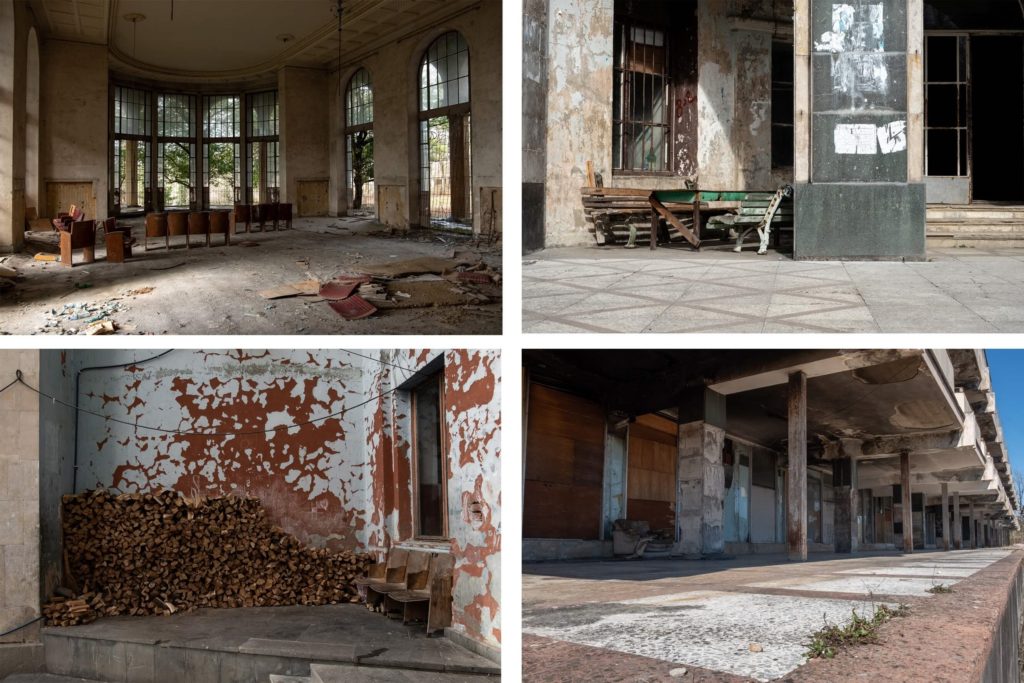
This is why some Georgians today are all the angrier about the forcibly displaced persons from Abkhazia. But these people didn’t have any choice but to convert and dismantle Tskaltubo in order to preserve at least the basics of their lives. At first, the refugees were only supposed to be housed there temporarily, but when Georgia slipped into a long period of civil war in the 1990s, they had to stay. With the collapse and disintegration of the state, Tskaltubo fell into a dystopian scenario. From then on, it represented a world in which the government could no longer provide for the care and security of its citizens. As long as these people and their descendants still have to live in Tskaltubo’s decaying sanatoria and convalescent homes, this Georgian wound remains open. And the same can be said of the many other former resorts, sports and industrial facilities where people who fled the Georgian-Abkhaz and Georgian-Ossetian conflict still live today. Many people in the country do not like to look at such a wound. But the ones who have been living within these dystopian spaces for 30 years now demand the right to be seen and no longer to remain invisible. Every life has a past, present and future – and each wants to be and should be recognised.
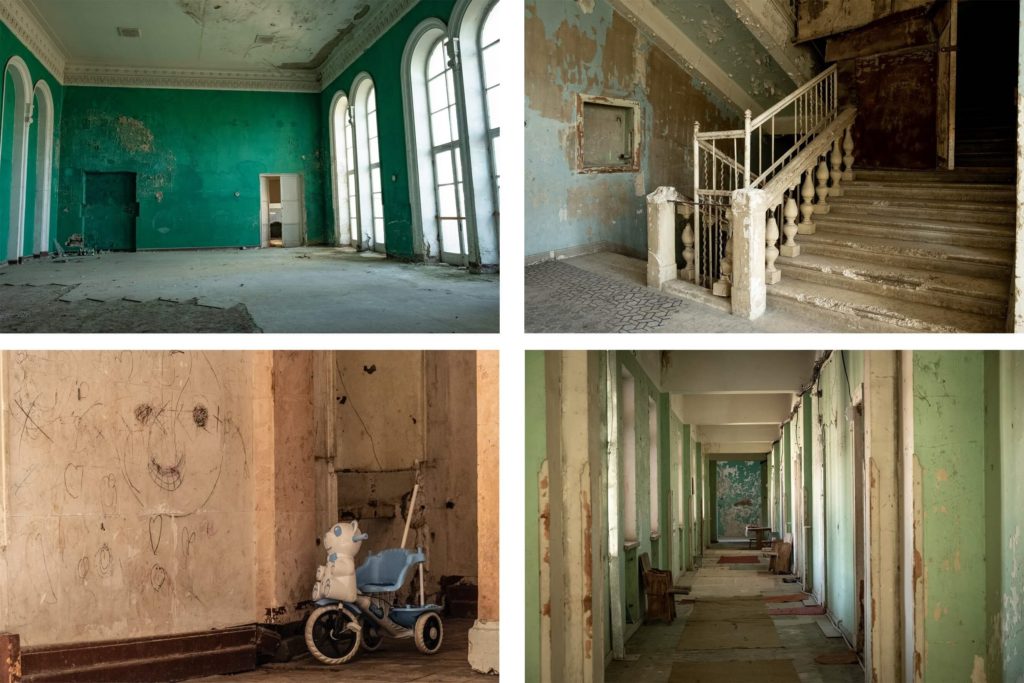
Herewith I sketch a few short vignettes to provide a taste of the flavour and texture of the emptiness that stalks the decaying grandeur of Tskaltubo.
The former teacher Lena
Lena is 82 years old today. She had studied in Moscow and been a teacher of English and Russian in Abkhazia for most of her life. All languages have always flown to her, says Lena. She knew Turkish and Armenian, and was able to speak even the difficult Abkhazian. But she hadn’t had a book in her hands for 28 years until two young girls from England came to Tskaltubo last year. By chance, Lena had met the students as they were searching through the ruins of the Hotel Imereti.
Of course, I made them tea right away! They couldn't believe it – a teacher without money for just one book! They left all their books with me! But what should I do with books after 28 years? I've long since stopped reading; otherwise, I would be sad all the time.
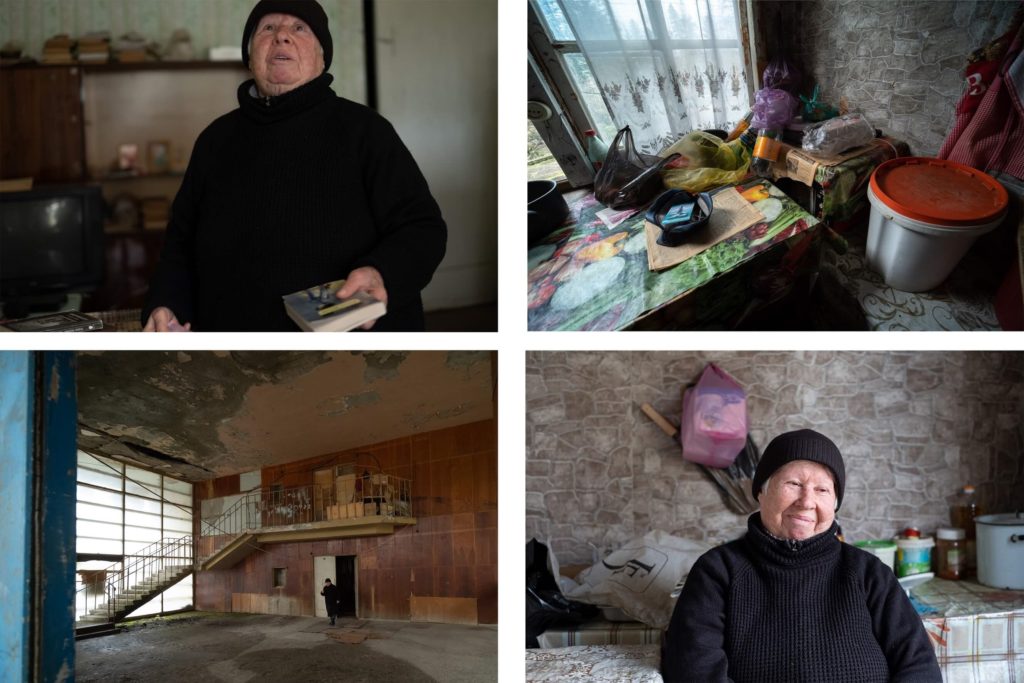
Lena’s husband had died during the fighting in Abkhazia. She had to flee on her own with her two children over the mountains through Svaneti. Finally, they reached Tskaltubo, where one room in the hotel ‘Sinatle’ was given to them. They put in a partition wall, closed off the balcony with windows and installed a small kitchen there. To this day Lena cooks on the petrol cooker, which she had to buy for a lot of money. She keeps everything in order and as clean as possible. The family has never had any heating system, but fortunately, it doesn’t often become freezing in Tskaltubo. That’s the advantage of living in a resort, says Lena, and laughs.
The children and grandchildren don't even know how well we had once lived in the Soviet era. And I too am slowly losing the memory of it. This beautiful life is disappearing from my mind and my heart – that's what's so terrible about it.
Now she is alone, here in her room. Her son, who had stayed with her despite his marriage, has died, and her granddaughters are studying elsewhere. Her daughter works in Tbilisi. The $70 pension that Lena receives per month is not even enough for her daily food. This is why her daughter comes from Tbilisi with food as often as possible to help take care of her mother. But even her daughter does not have much, says Lena. Because if you have to start over with nothing, you can’t escape poverty in Georgia in two generations.
Meanwhile, she could not, and would not want to move. At least here she has neighbours who look after her, and she is happy about the children around her. But certainly, she wishes that these children would not have to grow up in ruins. Lena has always loved children; that is why she became a teacher.
The bazaar: centre of life in Tskaltubo
The bazaar is the central place where people from Tskaltubo and the surrounding smaller towns come together. It is the traffic junction where buses stop and taxi drivers wait for customers. The bazaar building, erected in the style of Soviet modernism using glass, iron and concrete, is in disrepair. Nevertheless, the ground floor and first floor are still used for the sale of food, clothing, electrical goods and other articles of daily use.
High unemployment turns many men into taxi drivers who spend the day waiting. Travel costs are low, yet the poorest still cannot afford the ride. The small but thriving ad hoc market behind the building provides a powerful insight into the challenging financial situation people subsist in. It illustrates how more than 50% of the population of Georgia has had to supplement their household income by growing fruit and vegetables for sale. But where many are forced to do so, little is earned. Most of the people who buy and sell here have left the best part of their lives behind in Abkhazia (cf. Applis 2020).
In the market district, there is also space for small shops – bakers, shoemakers, tailors, tool dealers. Among the inhabitants of Tskaltubo, the lines of prosperity have long since disappeared. Many of the craftsmen experienced the city while it was still in its heyday; cobblers and tailors learned their professions here and can well remember the 1980s.
Life has, of course, been better – more pleasant and more enjoyable above all. People came here to relax. The money was easy for them; everyone wanted to look good when they were strolling around. And that is why they needed us. Because where they came from, from Central Asia, from Siberia, the fabrics and leather we worked with here in Georgia were often not available.
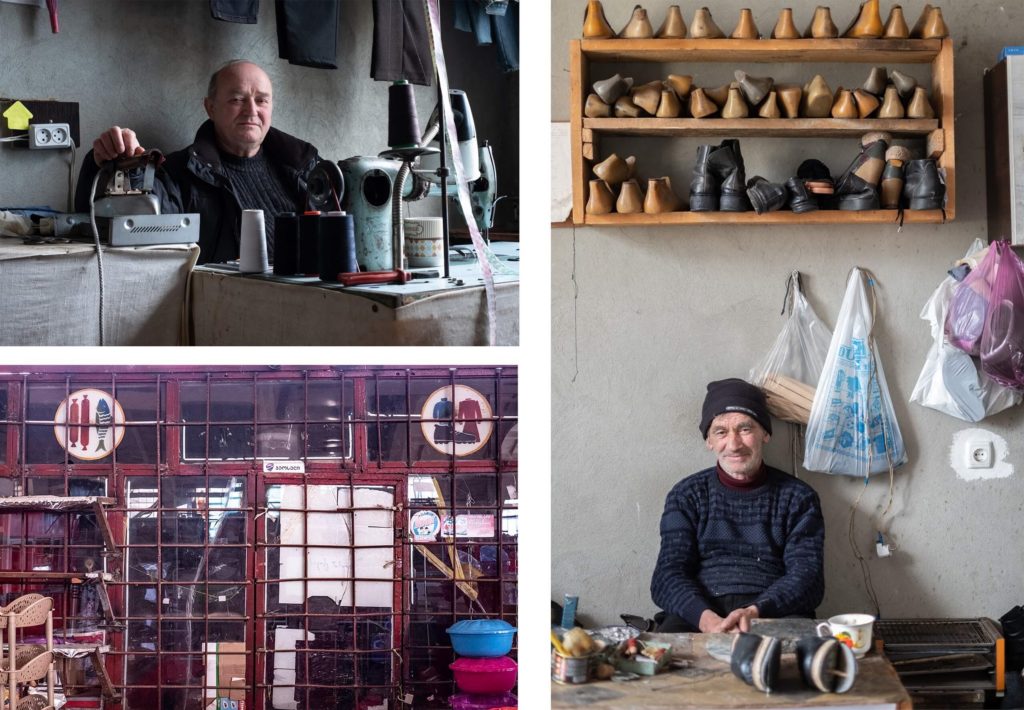
Even today, the two masters of their profession cannot complain about a lack of work. Those who have little bring what they have to be repaired until it doesn’t work anymore. The prices, however, are low and so they sit all day long, passing the time talking and waiting for customers to provide the money they need to live.
The former construction worker Guram
Back in Abkhazia, 62-year-old Guram had had a house in Sukhumi, just five minutes from the beach, 200 square meters in size; he and his family had had everything they needed. He had worked on building sites for half the year, while in the other half, the tourist season, they rented out rooms to summer visitors. Everyone in the Hotel Tbilisi comes from the same neighbourhood in Sukhumi. Some have left, but Guram had never wanted to go. His wife and other relatives are buried here in the cemetery in Tskaltubo. Having his relatives’ graves here means he couldn’t move to another part of Georgia.
Do you understand that I could never leave from here? We'll make the best of it. That's just the way life is. We grow everything ourselves – tomatoes, cucumbers, a pig every year, we make wine and juices. And now and then the boys need me when they work on the building site for a new hotel in Tskaltubo. Then I tell them how to pour the concrete or set the walls.
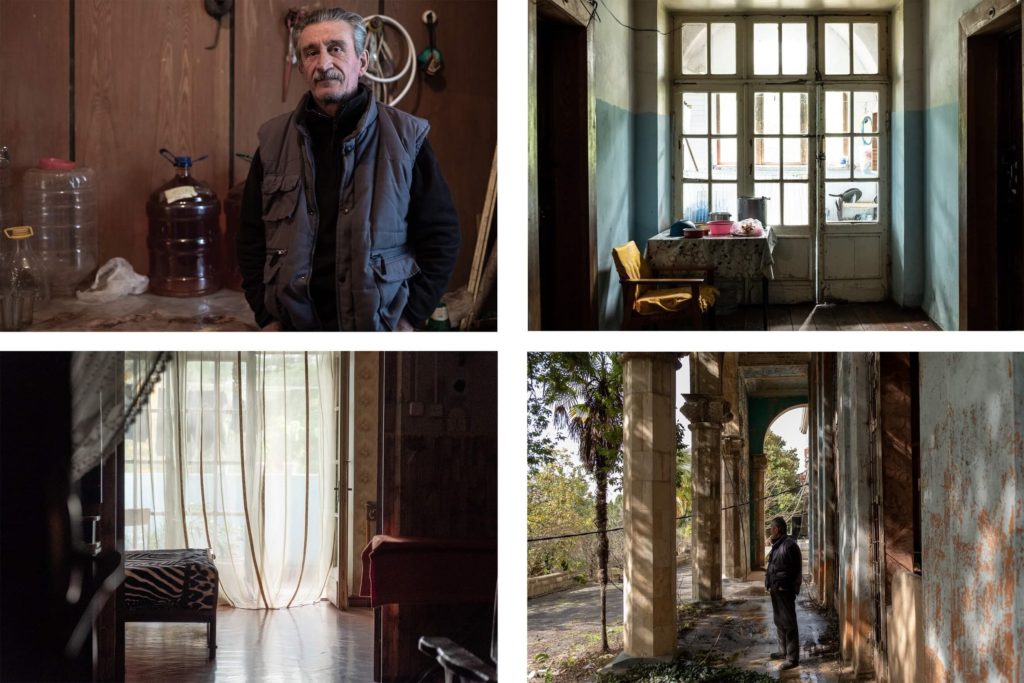
He is proud of what they have achieved, despite their deprived circumstances. They had to secure the buildings’ upkeep with the work of their hands and without any money at all. They converted the rooms to apartments. They bought all the furniture themselves; the spirits, the juice, fruit and vegetables are all their produce – in large gardens, they grow everything themselves.
Guram explains that after the expulsion, he had worked on building sites in Russia; for example, in Sochi, like many other men from Tskaltubo, during the Winter Olympics until not having any papers, the police picked him up and sent him back. His son is now – like the sons of many others – working in Poland as a migrant labourer. He took over the money-earning role from his father, who is looking after the rest of the family here. Unfortunately, he says, everything is repeating itself; the poor people are being passed around without any long-term chance of changing their situation for the better. If you have a family, you don’t ask questions.
If there were not cheap flights from Kutaisi to Hungary and Poland – we could not live at all. Because here in Georgia, there is no work for us. Unfortunately, there are also bad people in these countries who don't pay our boys after work is done. But what can we do?
At one table with Europe
The dignity the forcefully displaced families in Tskaltubo have retained and claim for themselves appears to consist primarily in hosting others: inviting someone into their home and sitting around a big table – as they all repeatedly emphasize – links them to Europe. They see a further connection to Europe in the splendour of the decaying buildings, pointing out that it was, after all, German prisoners of war who put up the first buildings here under Stalin.
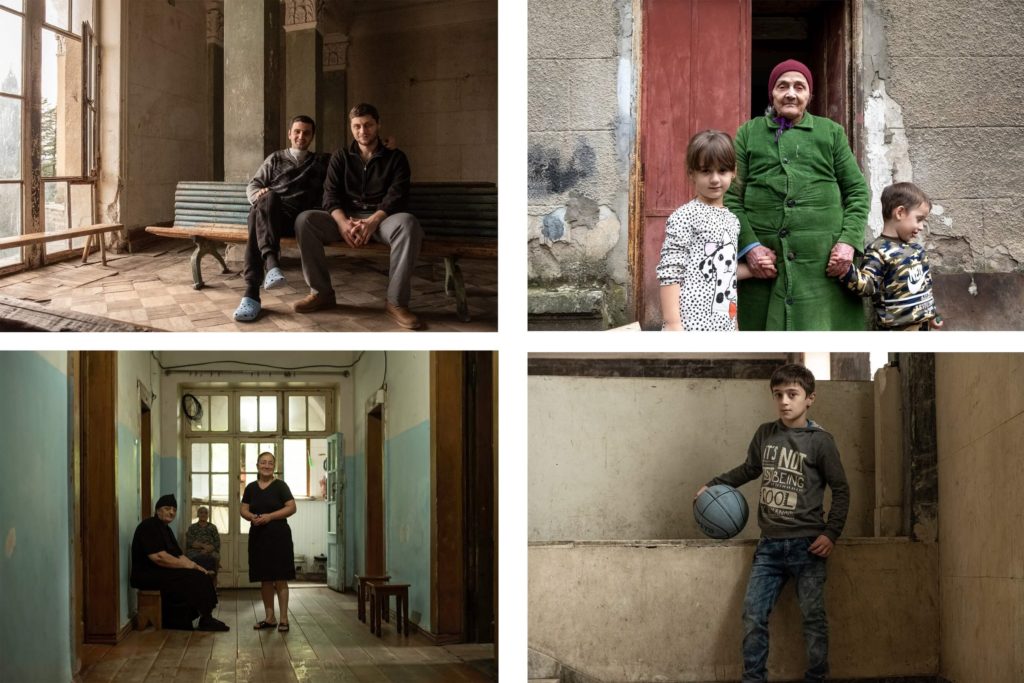
Despite the precariousness of the circumstances, you always meet people who show visitors around – not without a particular pride in the remains of the buildings’ past glories, of which the second generation there has only seen in pictures (cf. Applis & Tserediani 2020). They lead visitors, as if it were nothing, over rubble, up collapsing staircases, and dodge holes in the corridor floors. It is as if they were not aware that there is something unsettling about having been born and grown up in such conditions.
Like many other young people in Georgia, they feel a desire to be connected to Europe in the images they create of their future. Yet, they are captured by structures that will continue to operate in the country for a long time to come.
Many such stories of life in Tskaltubo could be told. As many as there are people.
All previous tourism marketing strategies of the Georgian state to rebuild Tskaltubo as the Spa Capital of Eastern Europe relied on the success of the resettlement process of the displaced people to attract interested foreign investors. To this day, however, internally displaced persons still live there and the reconstruction of the old sanatoria has not yet begun.
This is an Open Access article, distributed under the terms of the CC-BY (Creative Commons Attribution 4.0 International) licence, which permits unrestricted re-use, distribution, and reproduction in any medium, provided the original work is properly cited.